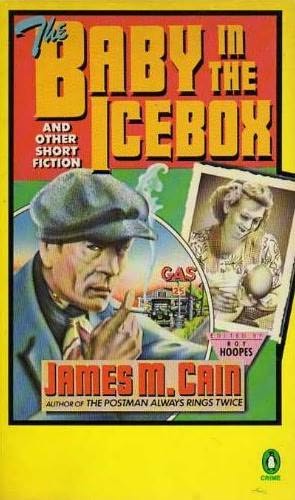
I read The Postman Always Rings Twice yesterday. I love the film noir with John Garfield and Lana Turner, and I enjoyed Cain's novella more (I know, I know--you can't judge the same story rendered in different artistic media, blah blah blah). If Cain is a hack, he is an American hack in the tradition of Edgar Poe. I mean he maps the hardscrabble terrain of alluring psychotics from the first person point of view better than most anybody. To get into the American psyche is to understand a certain type of psychotic (in this case, the fast-buck killer). And, like Poe, Cain definitely makes literature out of a hack's story.
These days I am writing about a (fictional) murder, so I thought Cain would be a helpful detour. I have been having this horrid doubt, however, that the story I am working on will not be "literary" enough. However, I think I traced the source of this peculiar insecurity.
One of the major problems with much of the "literary fiction" being published in the usual little journals (i.e. GlimmerTrain, Zoetrope, and the others Stephen King recently referred to as, "the shit nobody reads") is that the writers are not trying very hard to engross an ordinary reader. What I mean by that is they are trying only to engross other writers of "literary fiction." Gentle humor underlies either a) lyrical intensity (conventional fiction), or b) clever prose styling (metafiction, also known as conventional fiction). Yawn. With subtlety and nuance, fully formed characters make dinner, go shopping, and discuss food in Paris or New York City (I'm looking at the current issues of the two journals named above). Yawn, *stretch*.
Of course, in the shit most people do seem to be reading, in the novels with pink covers and pictures of Renee Zellweger on them, unmarried female characters make dinner, go shopping, and discuss food in LA, London, New York, or Paris. Hm. I guess that makes it "chick lit" and not "literary lit." I haven't read any chick lit other than Jane Austen, so maybe some of the new stuff is literary. It would surprise me if it weren't. Whether it is or not, it won't make it into the little journals.
It is as if a narrative in danger of sliding into any genre whatsoever might not get the dubious prestige of being identifiable as "literary." There are, of course, great stories in which almost nothing happens in the sense of a plot (Raymond Queneau's Exercises in Style is a personal favorite), but now it seems that if anything were to happen, it wouldn't be called "literary fiction." It's hard not to blame James Joyce. (Goddamned Dubliners!) Of course, the problem is the strange negotiation publications in the late capitalist era are making to try to capture the diminishing market. The little journals seem to be carving out their niche—something they call "literary fiction." They are, of course, merely smaller businesses identifying a market they want to capture. Zoetrope has the tagline, "The New Generation of Classic Short Stories." Hilarious! Can you imagine a story such as Cain's "Baby in the Icebox" making it into Zoetrope?
I guess one of the problems is the drive on the part of publishers, even publishers of the little "literary" journals unread except by other writers, to market their product. What is "literary fiction" as distinct from all other genres supposed to mean, anyway? Can you imagine dear Ray Bradbury trying to get his start now? He'd be pegged as hopelessly inconsistent for the marketplace: "Sunlight and Shadow," literary fiction; Dandelion Wine, lad lit; The Halloween Tree, children's lit; Fahrenheit 451, current affairs. I can hear the query letters dropping unceremoniously in editors' trashcans. Thank god large-market magazines like Playboy (which first published the short version of Fahrenheit 451) still published good fiction when Bradbury "emerged," as they say in the little journals.
Truly, who wrote the law that a horror story, for example, can not be "literary"? What about Stevenson, Poe—even Henry James (a writer of ghost stories)? I know there has always been market pressure in fiction, but sweet Jesus! Look in the Writer's Market and you will see publishing houses of all sizes and, even worse, scurvy agents demarcating their interests along extremely restrictive lines. Interesting writer? Don't care. Easy to define? Easy to peddle? Okey dokey! RIP Marion Boyars.
Of course, reading culture itself now has been taken off life support. How many of you not married to K-12 teachers know that silent reading is now banned in a growing number of school districts around the country? Don't believe me? Check it out. It seems silent reading is deemed not conducive to raising test scores. Teachers are no longer allowed by their administrators to have their pupils sit silently enjoying a book in school. No wonder writers are left as the only readers of the cramped little journals. No wonder the little journals print cramped little literature.
When the most successful, the very top, literary mags have a readership of ten thousand in a country of over 300 million, we are screwed. When the ten thousand readers are all trying to write the same way to garner the "literary" label so they can recruit agents representing "literary fiction," literature is screwed.
And yet, I write. What the hell is wrong with me?

No comments:
Post a Comment